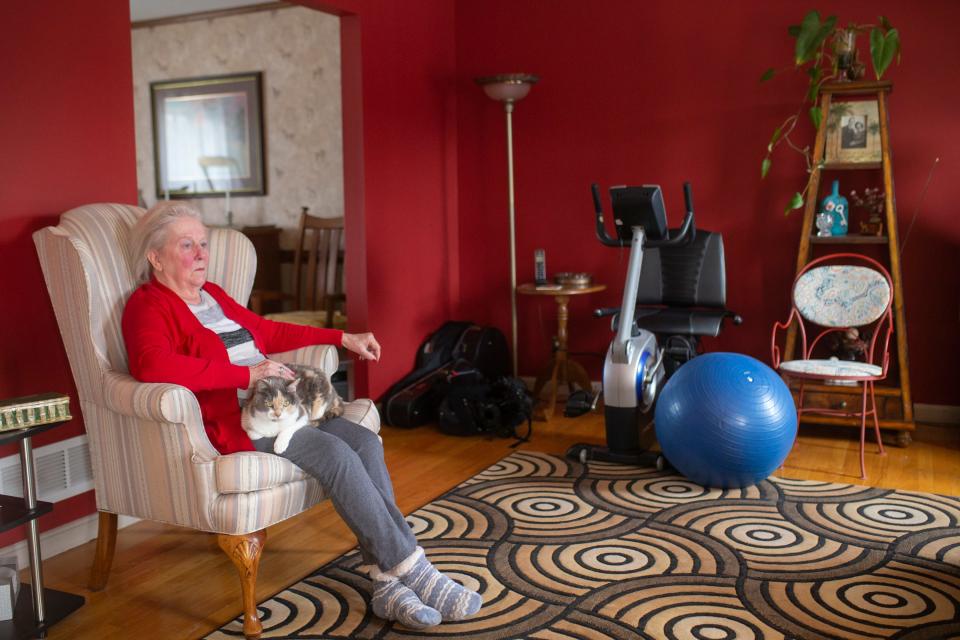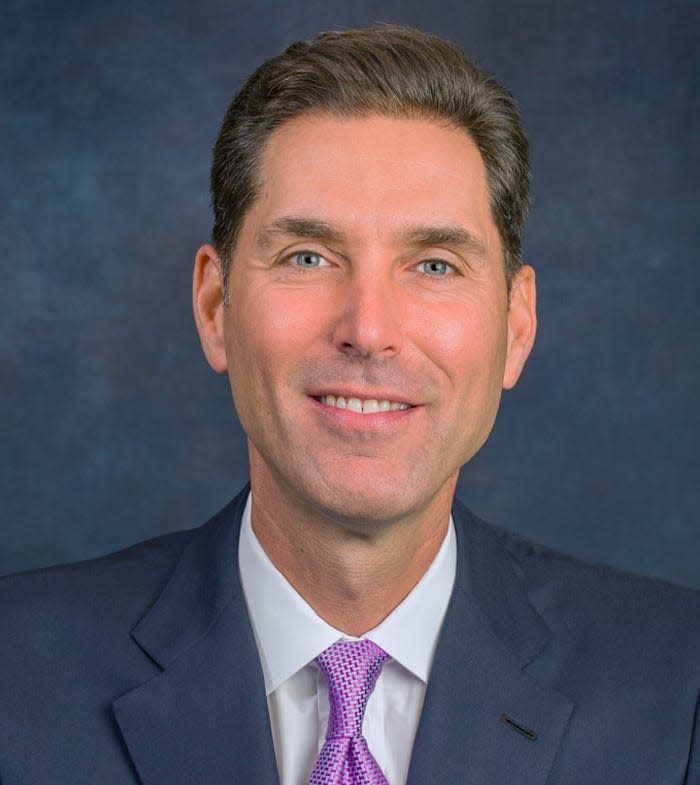Trump's push to reduce drug prices in State of the Union boosts hope for action this year
President Donald Trump's call during his State of the Union address for bipartisan action to lower drug prices was welcomed, but advocates wonder whether it will be enough to "get a bill to my desk" for a promised signature.
Federal legislation to rein in costs is winding its way through Congress, but despite broad support by both parties and the president for the concept of lower prices, disagreement on the best approach, the looming national election and push back from pharmaceutical companies lowered the odds of sweeping change this year.
Trump's comments Tuesday may have tipped the scales toward passage of some kind of drug price relief, but what it would be is far from clear.
The Senate Finance Committee, House Republicans and House Democrats all have different plans aimed at lowering prescription drug costs for seniors with Medicare. With 42 million participants, the government-run program is the biggest single purchaser of drugs and its rates are often used as a basis for private insurers, so changes can ripple through the nation's entire health care system.
Like the House Democrats' bill, the legislation passed by the Republican-controlled Senate Finance Committee would require drugmakers to pay rebates if drug price increases exceed inflation and set annual out of pocket caps for enrolled patients. Those provisions have bipartisan support, as does another feature of both bills that would deter drugmaker "price gouging" when Medicare patients hit out-of-pocket spending caps, said the Campaign for Sustainable Drug Pricing.
The Senate committee plan, cosponsored by Charles Grassley, R-Iowa, and Ron Wyden, D-Ore., is awaiting a vote by the full chamber, but Majority Leader Sen. Mitch McConnell, R-Ky., has not scheduled one.
House Democrats greeted Trump's call for bipartisan changes by chanting "HR 3." The chamber passed its so-named drug price legislation but with only two Republican votes. In a statement after the State of Union, Grassley called on the House and Senate to work together to get legislation to the president soon.
Unlike the Senate bill, HR 3 would let the government negotiate drug prices like pharmacy benefit managers do for private insurance plans. The federal government isn't allowed to bargain under law. The proposal would start the government's negotiating at 120% of the average price for a drug among a group of six large developed countries' prices.
Americans often pay at least two times what patients in other developed countries pay for the same brand name drug, according to an October 2018 Department of Health and Human Services report. Drug companies and many Republicans typically oppose using an "international reference price," but Trump said Tuesday it is wrong that "Americans pay vastly more than people in other countries for the exact same drugs."
"Seeing the amount of overlap there is between the White House, HR 3 and the Senate, it feels like Washington ought to be able to get something done," said Ben Wakana, executive director of the nonprofit Patients for Affordable Drugs.
One in four Americans can’t afford to pay for their medications, a Kaiser Family Foundation survey found, and 80% believe drug company profits are the top reason drug prices are so high.
While Trump said during his address that drug prices are their lowest level in 46 years, pharmacy benefits consultant Susan Hayes said he was referring to what retailers get for drugs, not what consumers pay. The actual consumer price, she said, "is not going down."
Sue Lee, a Trump supporter in Crestwood, Kentucky, was heartened by the positive tone of Tuesday's speech. She is "always hoping our government can achieve lower drug prices." After all, she has Medicare Part D drug coverage but stopped taking Humira for her plaque psoriasis in 2017 because she couldn't afford it.
In Los Angeles, Saunta Anderson watched, too. The liberal Democrat nearly went blind when she couldn't afford to pay for Restasis drops for her chronic dry eyes. She said Trump's comments "could be a step in the right direction," but she's "a little hesitant to totally believe in many of his promises."

All sides are focused on May 22, the deadline to renew several Medicare and Medicaid spending priorities. Drug pricing provisions could become amendments to bills to extend that funding.
Advocates say struggling seniors can't afford to wait any longer.
"We know the status quo is simply unsustainable," said Megan O'Reilly, AARP's vice president of federal health and family, government affairs. "People don’t understand why we pay the highest prices in the world. That is the sense of urgency and why they are expecting to see meaningful reform enacted this year."
Pharma says no to negotiation
Action to limit out-of-pocket costs for Medicare patients and spread deductibles through the year are among the most likely provisions to get added to the spending packages as even drugmakers support the measure.
More than 1 million Medicare patients with Part D drug coverage hit the "catastrophic" level of drug coverage every year and have to pay 5% of the cost of their medications. That comes only after they hit $6,350 in out of pocket costs. Nothing rolls over; the next year they again have to meet the out-of-pocket limit before the reduction kicks in.
The proposed $2,000 limit in the House Democrats' bill or the $3,100 one in the Senate Finance bill could be life-changing for patients such as Lee and Anderson. Drug companies and insurers that manage Medicare drug plans would cover some of the additional money previously paid by the government and consumers.
The Pharmaceutical Research and Manufacturers of America is opposed to allowing Medicare to negotiate drug prices, especially against an international reference price. The trade group's CEO Steve Ubl said there's a big price to pay with negotiation.
"When you look at countries that have adopted government price setting, patients have less access to effective therapies," he said. "Across cancers, patients in the U.S. have better outcomes."
In its review of the House Democrats' bill to allow Medicare negotiation of up to 50 drugs, the Congressional Budget Office said drugmakers would launch eight to 15 fewer drugs in the first decade after such a bill passed. A decade after that, there would be 30 fewer drugs developed because of lost industry revenue to pay for research and development.
Ubl said drug prices help cover the cost of research for medical breakthroughs, such as promising forms of immunotherapy to treat cancer.
"It is a really exciting time with the industry developing really transformational drugs," he said. "Against this backdrop with this incredible innovation cycle happening within the companies, both drug spending and drug prices on a net basis are growing under the rate of inflation."
Developing such life-saving treatments mean boom or bust for the drugmakers. That's what sets drug companies apart from other industries in health care, such as hospitals or insurers, Ubl said.
"The affordability challenges at the pharmacy counter can be addressed," said Ubl. "We understand there's going to be some industry pain. We want to make sure that the pain is applied to actually lowering what patients actually pay."
Drug prices are "rapidly decelerating," he added.

'No excuse in the world'
But David Mitchell, founder and CEO of Patients for Affordable Drugs, said the pharmaceutical industry isn't going nearly far enough to truly lower drug prices.
"They only want to address what people pay out of pocket," said Mitchell, who estimates his share of the cost for Pomalyst, one of the drugs he takes to treat his incurable blood cancer, will be $14,000 this year.
Mitchell said the drugs' high costs don't "magically disappear" – people still pay for them in higher premiums and taxes that fund Medicare and Medicaid programs. Lowering drug prices and out-of-pocket costs "have to go hand in hand," he said.
Mitchell cited an Axios analysis showing drugmakers receive 20% of health care revenue overall but earn more than 60% of the profits.
And AARP noted 80% of the money spent by the pharmaceutical industry goes to areas outside of research and development. In fact, the major drugmakers spent nearly $169 million for lobbying and more than $6 billion for advertising in 2018, AARP said, citing data from the Center for Responsive Politics.
Anderson struggles to pay $300 a month for Restasis, just one of the prescriptions she takes for conditions related to her rheumatoid arthritis, diabetes, acid reflux and anxiety. She is on disability but uses her husband's work insurance plan instead of Medicare, which charged even more.

Like Anderson, her sister Teka Pruitt has rheumatoid arthritis, but her Medicare managed care plan provides no coverage at all for the drug she needs, leaving her with deformed bones and a much more serious version of the condition.
"It is so disgusting to me that we are the richest country in the world and some people are going without because they can’t afford their medication," said Anderson. "There's no excuse in the world. They're capitalizing on people's illnesses."
Lee was diagnosed with plaque psoriasis in 1999. Itchy, painful rashes started at her elbows and progressed to her legs. For over two years she tried various treatments, and each time the skin condition came back worse. Then she tried Humira.
“I was on Humira for a few months shy of five years and it was the wonder drug for me,” said Lee. “Then I retired and I went on Medicare and I couldn’t get assistance for my co-pay. I could not afford Humira, it was going to cost upwards of $8,000 per year.”
When Lee stopped Humira in 2017, the condition came back with a vengeance, covering her from her ankles to ears. She said she sat and cried with cold packs on her legs. For the past year she's been participating in a clinical trial that has stopped her symptoms, but she's unsure what she'll do when the trial is over in three years.
Lee, an advocate with Patients for Affordable Drugs, is outraged her well-being depends on a clinical trial so her medication is free.
"At the end of the clinical trial, what do I do if Congress hasn't done anything?," said Lee. "I live in fear. It's on my mind all the time."
Contributing: Alton Strupp, Louisville Courier Journal
This article originally appeared on USA TODAY: Trump and drug prices after SOTU: Will prescription reform pass?

